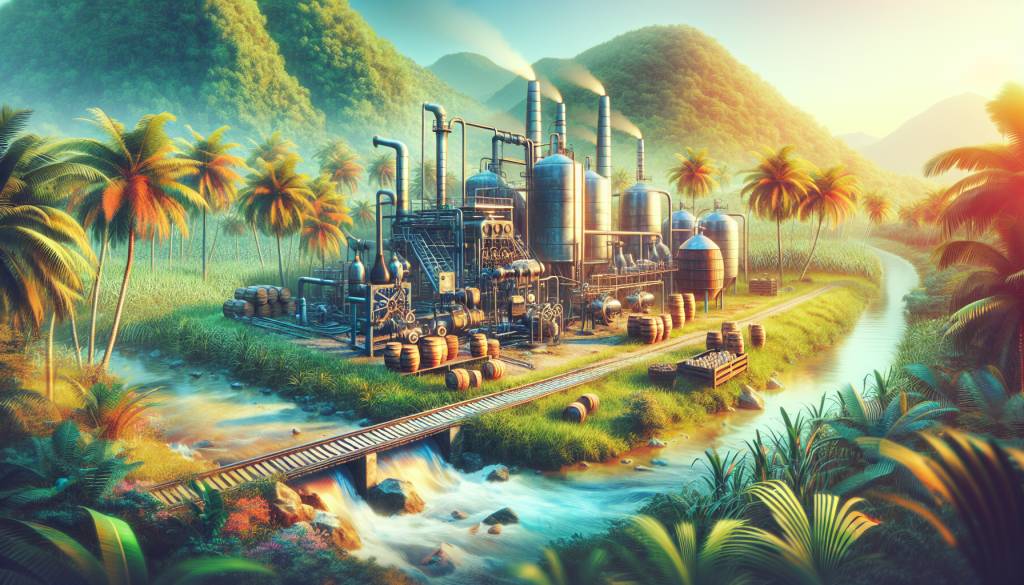Discovering the Rich Heritage of Martinique’s Rum Distilleries
Rum production in Martinique is not just a business—it’s an embodiment of the island’s rich cultural heritage. As one of the most revered rum producing areas in the Caribbean, Martinique has developed a reputation for its distinctive « rhum agricole, » a style of rum made directly from sugar cane juice rather than molasses, which is more commonly used elsewhere. Embarking on a tasting tour of Martinique’s rum distilleries offers both connoisseurs and casual enthusiasts an opportunity to savor this local tradition and to understand the meticulous craft involved in its creation.
The Aromatic Landscape of Martinique’s Rhum Agricole
The island of Martinique boasts a volcanic landscape that greatly contributes to the fertile soil ideal for sugar cane cultivation. This natural advantage is a key ingredient in the premium quality of Martinique rum. Unlike most rums, « rhum agricole » carries the distinctive Appellation d’Origine Contrôlée (AOC) designation, similar to fine wines, ensuring that production adheres to strict regulations and standards intrinsic to its unique flavor profile.
The process of crafting « rhum agricole » begins with the harvesting of sugar cane, which is then pressed to extract fresh, sweet cane juice. This juice is fermented and distilled, a process which must occur within 72 hours of harvesting to capture the essence and freshness of the sugar cane. Aging in oak barrels imparts complex flavors ranging from subtle floral notes to deep, earthy undertones.
Top Distilleries to Visit on the Island
For those eager to explore Martinique’s rum distilleries, a tapestry of experiences awaits. Each distillery has its own unique story, fervently captured within their distinct rum offerings.
- Habitation Clément: At the forefront of « rhum agricole » production, Habitation Clément offers more than just tastings. It’s a journey into the island’s history, with its beautifully preserved estate and art collection, offering insight into the traditional craftsmanship of rum making.
- Distillerie J.M.: Located at the base of Mount Pelée, the microclimate and rich volcanic soil around Distillerie J.M. contribute to the nuanced flavors of its rums. An exploration of their facility reveals the close relationship between the island’s natural resources and the final product.
- La Mauny Distillery: Nestled in the lush southern part of the island, La Mauny Distillery is known for its innovation in blending techniques. Their rums offer an exquisite range of flavors that capture the essence of the island’s terroir.
- Rhumerie de Saint-James: Saint-James is celebrated for its museum that narrates the history of rum in Martinique. A visit here is both educational and sensory, as one learns about the profound connection between the island’s culture and its signature spirit.
The Impact on Local Economy and Tourism
The rum industry in Martinique is more than just the lifeline of local tradition—it’s a substantial contributor to the economy. The island’s distilleries generate significant employment opportunities, supporting not just the agronomy of sugar cane but also tourism. Visitors to the island often leave with bottles of their favorite rum, but also with a deeper appreciation for the ancestral knowledge and techniques that go into every drop.
Sustainable Practices in Martinique’s Rum Production
Sustainability and environmental consciousness are at the forefront of Martinique rum production. Many distilleries on the island adopt eco-friendly methods, such as using bagasse (the fibrous remains of sugar cane stalks after juice extraction) as a biofuel to power facilities. This cycle of renewal underscores the island’s commitment to a greener future, intertwining with the heritage and modernity of rum production.
Rum Tours and Tasting Experiences
Travelers visiting Martinique have the unique opportunity to participate in guided rum tours. These experiences are designed to educate guests on the production process while indulging in tastings that showcase the variety and complexity of the island’s rum. From sipping on premium aged rums to enjoying signature cocktails, the tasting experiences are as diverse as they are flavorful.
Moreover, rum tours often provide a broader cultural perspective, as they might include traditional creole meals, dance, and music, enveloping visitors in the full Martinique experience. Not only do these tours highlight the versatility of rum in gastronomy, but they promote a deeper understanding of the local customs and traditions.
Pairing Rum with Local Cuisine
Any discussion of Martinique’s rum would be incomplete without mentioning the local cuisine, a tantalizing fusion of African, French, Caribbean, and South Asian flavors. The island’s gastronomy complements its rum, with dishes that accentuate the complex profiles of the spirit. Rum is often used in local recipes, further marrying the culinary arts with this storied beverage.
A typical Martinican meal might include dishes like « accras » (cod fritters), « colombo » (a curry-like dish), or « banane pesée » (fried plantains), each offering a dazzling array of flavors when paired with a carefully chosen rum. Visitors can enjoy these pairings at the distilleries themselves or at local eateries across the island, adding a gustatory dimension to their rum exploration.
Embracing the Spirit of Martinique’s Rum
The legacy of rum making in Martinique encaptures the heart of the island’s local practices and globally acclaimed savoir-faire. Exploring the island’s rum distilleries is not just about tasting an alcoholic beverage; it’s a profound immersion into a way of life that brims with pride, tradition, and nuanced flavors. Whether you’re a rum aficionado or simply curious about the island’s unique offer, Martinique’s rums provide an insightful window into the island’s soul.
In choosing to visit Martinique’s distilleries, you’re not only treating your palate to world-class spirits, but you’re also supporting an artisanal industry that is integral to the island’s character and its people’s livelihoods. The experience promises to be enlightening, enjoyable, and, most certainly, delicious.



